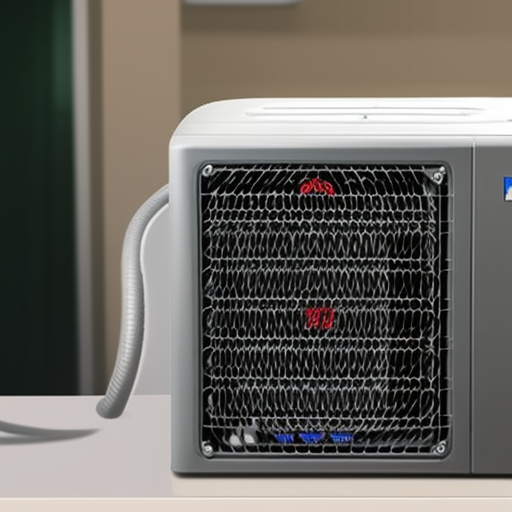Are you looking to keep the heat out without breaking the bank? A mini air conditioner (AC) may be just the solution. Designed to be both energy-efficient and cost-effective, these small cooling solutions are quickly finding their way into people’s homes. But how effective are they really? In this article, we’ll dive into the various pros and cons of a mini AC to help you decide if this is the right cooling solution for you.
Comparison with Regular-Size Air Conditioners
When considering a mini AC, some may question its ability to adequately cool a space compared to a regular-size air conditioner. While larger units may have a higher cooling capacity, there are a few things to consider when deciding which one to choose.
Firstly, the size and layout of the room you plan to cool can play a role in the effectiveness of a mini AC. If you have a smaller space or just want to cool a specific area, a mini AC can be a great option. For example, if you’re working from home in a small office, a mini AC can be the perfect solution to keep you cool without having to cool your whole home. Additionally, mini ACs are compact and portable, making them easy to move from room to room, which is perfect for people who rent or move frequently.
Furthermore, mini ACs are more energy-efficient than regular-size air conditioners, which can save you money on your energy bills in the long run. They also use less refrigerant, meaning they’re more environmentally friendly. That being said, it’s important to note that a mini AC may not be as effective in cooling larger spaces or multiple rooms. It’s important to assess your cooling needs and choose the option that’s best for you.
Benefits of Mini Air Conditioners
Mini air conditioners are becoming more popular because of their cost-effectiveness and efficiency. They offer several benefits, making them a fantastic option for people living in small apartments, offices, or students living in dorms. One of the most significant advantages of mini air conditioners is their portability. Unlike traditional air conditioning units, mini air conditioners are small and can fit in tight spaces. You can move them around with ease, and they won’t take up too much floor or table space.
Another benefit of mini air conditioners is their reduced energy consumption. Unlike centralized heating and cooling systems that use a lot of power, mini air conditioners consume less energy. This means that you enjoy a comfortable temperature without incurring high energy bills. Mini air conditioners help reduce your carbon footprint and are an eco-friendly option. They are also easy to install and maintain, making them an excellent DIY option. If you’re looking for a reliable and efficient cooling solution that won’t break the bank, a mini air conditioner is a great option to consider.
In conclusion, mini air conditioners are a fantastic option for those who value portability, energy efficiency and cost-effectiveness. They’re especially useful in small spaces, and you won’t need professional technicians to install them. Also, they consume less energy, which means lower energy bills and a reduced carbon footprint. With a mini air conditioner, you can enjoy a comfortable indoor climate without breaking the bank. So, if you’re considering investing in a cooling solution, a mini air conditioner is worth checking out.
Drawbacks of Mini Air Conditioners
If you’re considering purchasing a mini air conditioner, there are a few potential drawbacks to keep in mind. While these cost-effective units may seem like a great solution for small spaces or budget-minded consumers, they do come with certain limitations.
One of the primary is their limited cooling capacity. These units are designed to cool small spaces, which means they may struggle to provide consistent relief in larger areas. Additionally, they can be quite noisy, emitting a constant hum that can be distracting or disruptive, especially during quiet activities. Plus, they often have limited control options, meaning you can’t adjust temperature or airflow settings as easily as you would with a more advanced solution. It’s also worth noting that these units can cause an uptick in your energy bill if used excessively, since they lack certain energy-saving features found in larger units. All things considered, mini air conditioners can be a great option for certain situations, but it pays to keep their limitations in mind before making a purchase.
Energy Efficiency Considerations
When it comes to keeping cool, we all want to stay comfortable without breaking the bank. That’s why energy efficiency is a crucial factor to consider when choosing a mini AC. These compact units are designed to be efficient, but not all models are created equal.
To maximize energy efficiency with your mini AC, look for units with programmable settings that can be adjusted based on your daily routine. For example, if you’re at work during the day, you can program the unit to turn on just before you come home, rather than running it all day while you’re away. This can help you save significant energy and money in the long run. Additionally, choose a model with a high Energy Efficiency Rating (EER) to ensure that you’re getting the most out of every watt. Bold: Be sure to do your research and compare EER ratings before making a purchase to find the most energy-efficient unit that meets your needs. So from the discussion above, it’s easy to see why mini ACs are such a great option. Lightweight and efficient, they can provide the same dependable cooling power of a regular AC unit, just in a smaller, more affordable package. So whatever your needs, consider a quality mini AC for a great alternative to the expensive window units.